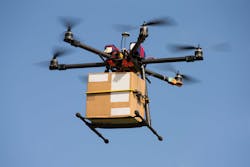Can Drone Delivery Change Logistics Networks for Retailers?
To better understand whether drone technology can become a game-changer in retail, researchers at The University of Texas at Dallas recently issued a paper on the subject.
Three faculty members from the Naveen Jindal School of Management focused on on the use of customer-facing delivery centers, also known as last-mile warehouses.
As reported by Brittany Magelssen on the University of Texas website, the study shows that while perfect customization of delivery-time guarantees is more profitable, retailers can capture a sizeable portion of the profit by partitioning their market into a few zones and offering the best-possible delivery-time guarantee for each zone.
“If a retailer promises each customer a different delivery time based on the customer’s location, that would be perfect customization,” says Milind Dawnde, professor of operations management and one of the paper’s co-authors.
“For example, a retailer could give any customer who is 1 mile away from a delivery-time guarantee of five minutes and a customer 1.5 miles away from a delivery-time guarantee of seven minutes. While perfect customization is theoretically best for the retailer, it is impractical. Instead, the retailer might offer all customers less than 5 miles away a guaranteed delivery time of 15 minutes. “In other words, limited customization is good enough.”
Dawande also predicts that a commercial rollout of drone technology will be rolled out on a larger scale fairly soon. This of course depends on how the industry deals with the issue of privacy and safety.
To view the complete study click here.
